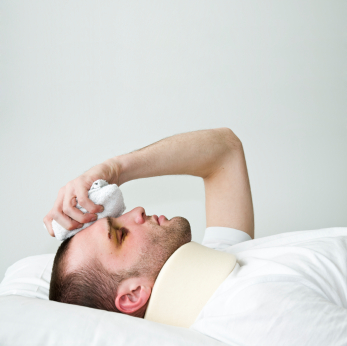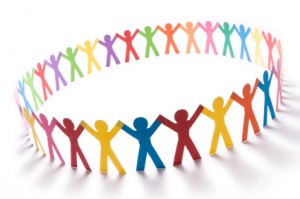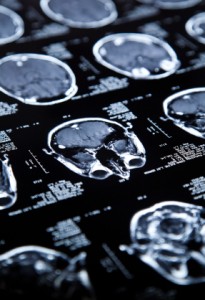We recently sat down with TryMunity co-founder Bernadatte Coleman to ask her about why she and her son, Mike Black, started TryMunity. She shared with us her plans for the social community’s future as well as the trials she and her family went through while caring for Mike’s traumatic brain injury.
What prompted you to start TryMunity?
When Mike had his accident, many of the medical personnel we spoke to gave us little or no hope about his recovery. We started a Facebook page to keep family and friends updated on his recovery since we were unable to answer phones while he was in ICU. People started connecting with us and sharing stories of their experience with TBI and these stories and words of encouragement helped us get through some dark times.
We started Trymunity to give those touched by TBI a place to go to share stories of encouragement and hope.
“The biggest challenge for Mike was coming to terms with his disability.”
Tell me a little bit about your family’s story.
Normal American blended family. Mike is the oldest at 28, Elle at 20. She is attending Boston Architectural College. There is Jessica, she is 14, and twin boys Tommy and Bobby.
Tell me more about Mike. What were his interests and ambitions prior to the accident?
Mike was an avid fisherman living in South Florida when the accident happened. He was 26 years old, just got his first apartment with his girlfriend. His career was just taking off when the accident happened.
How did the accident affect him physically, emotionally, and psychologically?
Mike had to learn to do everything again. Eat, drink, talk, walk… It’s been a very long, hard road to his recovery and we are not yet close to being done. He can walk now, but only short distances and his balance is very suspect. He falls quite a bit. This causes us some worry because statistics show that a person with a brain injury is eight times more likely to have a brain injury again. Though his attitude is very positive 90% of the time he still has his bad days. His left side is not back to where we would like it and he has trouble using his left hand. His memory is the worst part. Long term memory is fine but his short term is very bad.
What were some of the biggest challenges for him?
The biggest challenge for Mike, other than the physical challenges I discussed, was coming to terms with his disability. Not being able to just pick up and go hang out with his friends or go to work. Most TBI survivors find that their world shrinks to those immediate family members and caregivers and for a 27-year old man, this is very sad. Coming to accept his life as it is today is a big challenge but he is doing the best he can.
What or who enabled him to overcome said challenges?
TryMunity is helping him overcome the issues and challenges. He is on the site every day talking and supporting other TBI survivors. This is his job now, and he is very proud of the site and what he is doing to support others. This gives him purpose.
How is he doing now?
Mike is doing great! He has a lot of functional issues and his left side is not working so well because of the tone in his muscles caused by the coma and the brain damage, but he functions well enough now that we can leave him on his own for short periods of time. He is walking with a cane now, but his balance is suspect and we worry about him falling. Other than that, his short term memory is very bad and his reasoning skills, well…
“The stress on a family following an accident is real…”
I understand that traumatic brain injuries affect more than the survivors. It also deeply affects their families and primary caregivers, so tell me, what challenges did you face as a family after the accident and even now?
The impact on the families and caregivers is immense. When someone suffers a traumatic brain injury, the entire family is affected. At times, we have experienced feelings of burden, distress, anxiety, anger, and depression, especially early on in Mike’s recovery. The other children felt neglected and resented the time we all had to spend at Mike’s side.
The early hours, days, and weeks after the injury was very confusing. We were thrust into the world of the intensive care unit (ICU) with its unfamiliar lifesaving equipment, which is scary. A “good day” of progress may be followed by a “down” day. Setbacks are common. We found it emotionally devastating when the staff performed many necessary and unnecessary procedures and the doctors told us they didn’t know what the outcome would be. All we heard was, “time would tell, wait and see…”
Our family and friends wanted updates on how Mike was doing. These inquiries became overwhelming at times to deal with. Thats when we started the first Facebook page for Mike called the Beans Recovery Group.
No family is ever prepared to comprehend the full magnitude of the life changes that a traumatic brain injury creates. Once Mike came home, there were still many unanswered questions. The stress on a family following an injury is real. Our roles within the family changed, our financial circumstances changed. Brain injury is a life-changing event, so we are still unsure as to what is coming.
Please describe some of the frustrations you encountered in your attempts to find a TBI community you felt a connection with.
We had trouble connecting with a TBI community because of our lack of time between caring for Mike and work. Most online networks or forums had no real-time interaction, which frustrated us. We used Facebook originally, but it was too broad for our goals.
What people or organizations did you seek out for information, solace, and help?
We scoured the web for information but the only other site that offered us a lot of information is BrainLine.org. It’s a great site for reference.
“We don’t want to gain through TryMunity, we want to give.”
How does Trymunity work?
TryMunity works just like Facebook, just with a few tweaks and upgrades.
How has Trymunity affected the TBI community since its launch?
Hundreds and hundreds of people who have been effected with TBI have joined and more are joining every day. These people are finding a place where they can go and share their stories with people that understand what they are going through.
Has Trymunity been a good source for you personally in developing a support system with people going through similar experiences?
Absolutely! We are thankful that Mike is continuing to progress and we feel a need—or calling, if you will—to help other families get through their tough times when a tragedy like this strikes. It also continues to help us help Mike in many ways.
What have you and your family gained through the relationships you’ve been able to form in Trymunity?
A great sense of well-being in knowing we are helping others.
What kind of feedback have you received from the TBI community?
The most amazing positive feedback. We have been invited to speak at many conferences to share our story. Five in the last month!
What do you hope to gain through Trymunity?
We don’t want to gain through TryMunity, we want to give.
Any future initiatives or campaigns we should be on the lookout for from Trymunity?
Lots coming, but you have to join to find out!
If there was one thing you could tell those affected by brain injury, including survivors, caregivers, and families, what would it be and why?
Never give up. Remember our motto: ”You never fail until you stop trying.”
Technorati: KPUSTXMNSGW8
 Have you or a loved one suffered from a traumatic brain injury? Join us here at TryMunity and receive the love and support you need from other families going through the same thing. Our non-profit organization is here to provide support and awareness for people who suffer from head injuries. You can join the community and share your story, be inspired by survivors, and get more information on dealing with a head injury.
Have you or a loved one suffered from a traumatic brain injury? Join us here at TryMunity and receive the love and support you need from other families going through the same thing. Our non-profit organization is here to provide support and awareness for people who suffer from head injuries. You can join the community and share your story, be inspired by survivors, and get more information on dealing with a head injury.

 Concussions happen every day; they are caused when someone hits their head. This type of traumatic
Concussions happen every day; they are caused when someone hits their head. This type of traumatic  Recovering from a
Recovering from a  The brain is perhaps the most complex part of the human body, an organ that scientists and medical professionals continue to learn more and more about every year. Over the last 100 years the study of the brain and injuries to the brain has evolved from using bare hands and magnets to the cutting edge medical technology that is used today. Here at TryMunity we are committed to creating a community to increase support and awareness for traumatic brain injuries.
The brain is perhaps the most complex part of the human body, an organ that scientists and medical professionals continue to learn more and more about every year. Over the last 100 years the study of the brain and injuries to the brain has evolved from using bare hands and magnets to the cutting edge medical technology that is used today. Here at TryMunity we are committed to creating a community to increase support and awareness for traumatic brain injuries.
